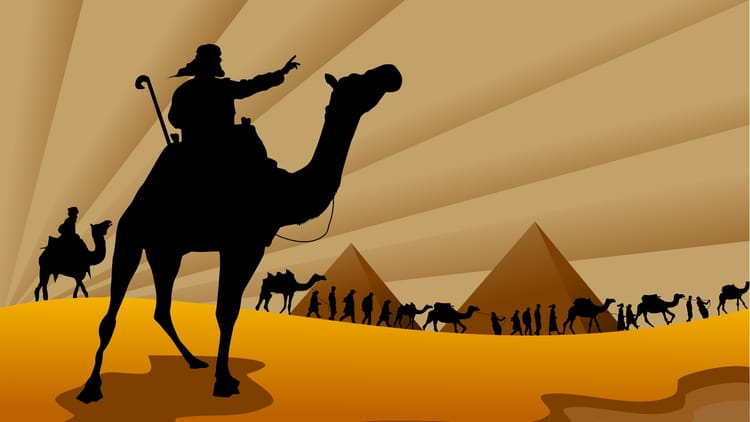Suffering and Hope (Exodus 1:1-2:10)

Big Idea: Expect to suffer, but trust in God to always keep his covenant promises.
You see it almost every day. It’s so familiar that we don’t even notice it every time. It’s the CN Tower, once the tallest freestanding structure in the world.
I don’t know if you’ve ever thought much about what you don’t see when you look at the CN Tower. One of the most critical components of the structure — anchors that hold steel cables that compress the concrete and give it its strength — can never be replaced, and so they were engineered to last 300 years. Twenty tonne lead weights supported on pendulums in the antennae mast move independently to slow down vibration. The base of the tower floats on bedrock more than 12 meters below ground. The tower sways by a few meters at the top, but you will probably never feel it. It could easily handle the winds of a category one hurricane, and it’s built to withstand an earthquake of 8.5 on the Richter scale. It’s engineered to last.
My question for you today is how we can engineer our lives to last. The CN Tower was built to withstand winds and earthquakes; how can we build our lives so that they will last no matter what comes our way?
This morning we’re beginning a series through an ancient book of the Bible called Exodus. I know that many people find the Old Testament, the Hebrew Scriptures, to be more challenging. But we’re going to discover the elements of great story within this book of the Bible. It’s compelling reading. And today in particular, we’re going to wrestle with the question of suffering. The passage we’re examining today poses the question of suffering, and how God’s people can stand up when things get really hard. It’s an important issue to face, because we’re all going to face suffering in our lives.
So if you have your Bibles with you, please turn them to Exodus. Let me give you a bit of background so that we can understand what’s going on. The first word of Exodus in the original language is “and” which implies it’s part of a story that’s already started. As we read this book, we’re already well into a story — a story that’s continuing today, by the way. We’re part of the story.
Here’s what’s happened so far. God created the world, and humanity has messed it up. So God launched a plan to fix what’s wrong with the world. To do so, he chose one family that would become a great nation, and through this nation he promised through a covenant to bless the entire world.
But already in Genesis, this family has come under threat. It looked like a famine would wipe it out. But God brought this family into Egypt, where it grew and thrived. When we get to the start of Exodus, we read: “But the people of Israel were fruitful and increased greatly; they multiplied and grew exceedingly strong, so that the land was filled with them” (Exodus 1:7). God’s promise was coming true. This small, nomadic family of shepherds family was preserved and grew into a mighty nation.
But then things got bad. We read in verses 8 to 10:
Now there arose a new king over Egypt, who did not know Joseph. And he said to his people, “Behold, the people of Israel are too many and too mighty for us. Come, let us deal shrewdly with them, lest they multiply, and, if war breaks out, they join our enemies and fight against us and escape from the land.”
And so this nation became a nation of slaves, forced into harsh labor. They lost their identity as an independent nation. They lost their freedom. They lost their ability to live comfortably. And they also lost their influence: those who are lower in the socio-economic scale are less able to organize themselves, and therefore less of a threat. Verse 14 says, that the Egyptians “made their lives bitter with hard service, in mortar and brick, and in all kinds of work in the field. In all their work they ruthlessly made them work as slaves.”
You’d think that it couldn’t get any worse than that, but in the second half of the chapter we read Pharaoh ordered the killing of the male children. This was a serious escalation. Once again, God’s promises were under attack.
It’s hard to understand this. Why would things go so badly after God had given Israel these promises? Why do things go badly for God’s people today? God has also given us many promises — that he is building his church, and the gates of hell will not prevail against it; that he is with us always; that when we seek his kingdom first, he will give us everything we need; that all things work together for our good. And yet the circumstances of our lives sometimes cause us to question what is going on in our lives, even if God really cares.
Why do things seem to go badly even when God has given us his promises? It’s an important question for us to consider. And in this passage we discover two truths. If we have only one of these truths, we’ll be confused about life and unprepared. We need both.
First, We Learn That We're Part of a Larger Battle
If the problem were just the Pharaoh mentioned in verse 8, then this passage wouldn’t have much to do with us. We don’t even know for sure who this Pharaoh was. He’s now a historical footnote, someone who has been long gone and who is only fascinating if you’re into history and archeology.
But it’s not just Pharaoh. We are part of a larger battle that began in the Garden of Eden, and that continues today. In the Garden, God told the serpent:
I will put enmity between you and the woman,
and between your offspring and her offspring;
he shall bruise your head,
and you shall bruise his heel.
(Genesis 3:15)
A conflict began that day between Satan and Eve that continues to this day. Enmity is a state of hostility, a declaration of war. Satan, who is a fallen angel, has been at war against God since the day that he rebelled. He succeeded in leading Adam and Eve to rebel against God, and ever since then our natural inclination has been to rebel against God and his purposes.
What does it mean that there’s enmity between Adam and Eve’s offspring and the serpent’s offspring? What offspring does the serpent have? I think what it means is that there’s a war between two kinds of people — those who follow God, and those who follow Satan. I agree with James Boice who said:
…the verse probably refers to the godly descendants of the man and woman, influenced by God himself, and the ungodly descendants of the man and woman, influenced by Satan. Certainly, the Book of Genesis goes on to distinguish between the two humanities (chapters 4 and 5).
If this is so, this is a message for the godly in every age. There is a divinely created animosity between the people of God and those who are not his people, and it is for our good. It is to sharpen our will to serve God.
In particular, Satan and his offspring have particularly been opposed to the line that leads to Jesus Christ. God’s people have always been under attack.
Eighteen hundred years or so of Hebrew history, capped by a full exposition in Jesus Christ, tell us that God's revelation of himself is rejected far more often than it is accepted, is dismissed by far more people than embrace it, and has been either attacked or ignored by every major culture or civilization in which it has given its witness: magnificent Egypt, fierce Assyria, beautiful Babylon, artistic Greece, political Rome, Enlightenment France, Nazi Germany, Renaissance Italy, Marxist Russia, Maoist China, and pursuit-of-happiness America. The community of God's people has survived in all of these cultures and civilizations but always as a minority, always marginal to the mainstream, never statistically significant. (Eugene Peterson)
This continues right to the present day. Experts say that 1 in every 12 Christians is considered to be suffering from “extreme” levels of persecution, in countries like Afghanistan, Somalia, Sudan, Pakistan, and more. It is estimated that more people have been martyred for Christ in the past 50 years than in the church's first 300 years.
Take North Korea, for instance. It’s the nation where Christians experience the widest extent of persecution in the world. many of the 300,000 Christians in North Korea are still suffering in prison camps, starving for lack of food rations and enduring hard labor for their faith in Jesus Christ.
This is a battle that will continue right to the end. The book of Revelation describes Satan’s ongoing opposition to God and God’s people. What does this mean for us? Revelation 14:12 says: “Here is a call for the endurance of the saints, those who keep the commandments of God and their faith in Jesus.” We’re to patiently endure and to keep serving God.
We should not be surprised when we are opposed. Satan and his offspring are at war against God and his people. I love how John Knox put it — a man who himself had been arrested and exiled for his faith:
Mark what has been the practice of the Devil from the beginning, most cruelly to rage against God's children, when God begins to show them his mercy. And therefore marvel not, dearly beloved, though this should happen to you. If Satan fume and roar against you, whether it be against your bodies by persecution, or inwardly in your consciences by a spiritual battle, do not be discouraged, as though you were less acceptable in God's presence, or that Satan might at any time prevail against you. No! … I have good hope, and my prayer will likewise be, that you may be so strengthened, that the world and Satan himself may understand and perceive, that God is fighting your battle. (John Knox)
When you face opposition and suffering, know this: there are others today and throughout history who have suffered worse. Pray for those who are suffering right now for their faith. And don’t be surprised by the small amount of opposition you are facing. Expect it. We’re part of a larger battle.
Never believe the lie that life is supposed to be easy. Somehow we have this idea that something is wrong when we go through hard times. We’re surprised and wonder what we’ve done wrong, or why God would allow this to happen. The Bible never promises us an easy life. On the contrary, it warns us over and over to expect suffering. Jesus said, “In the world you will have tribulation. But take heart; lI have overcome the world” (John 16:33). Never believe the lies of the prosperity gospel that promise you an easy life. It’s a lie that will leave you unprepared for what will inevitably come your way.
That’s one truth we need. But it’s not enough. If we just have this truth, we won’t have the confidence we need when we go through difficulties. We also need the other truth that we see in this passage:
God Is Active, Even When We Don't See Him
It’s interesting that in Exodus 1 and 2, God’s name is hardly mentioned. I’m sure for the people who lived then, God seemed mostly absent. What they could see was Pharaoh: Pharaoh who enslaved them, and Pharaoh who wanted to kill their children; Pharaoh the most powerful person on the earth.
But look carefully, and you see God’s hand. The more the Israelites were oppressed, the more they multiplied (Exodus 1:12). When Pharaoh ordered that the male children be killed, two midwives ignored the orders and allowed them to live. When one Israelite family could no longer hide their three-month old son, they placed him in the Nile, and the baby was found and adopted by Pharaoh’s daughter and became a member of the royal court. Despite being in Egypt, despite being oppressed, and despite being threatened, God continues to prosper Israel. He continues to keep his promise.
It’s just the same today. Even when sin is at its worst, even when God’s people are most under attack, God is still at work.
I’m not saying it’s easy. It may not be until eternity that we understand why God allowed certain things to happen. We may have lots of questions. But we can be assured that God is at work accomplishing his purposes even when we can’t see it. In his book A Sweet and Bitter Providence, John Piper offers these thoughts about God's providence:
Life is not a straight line leading from one blessing to the next and then finally to heaven. Life is a winding and troubled road. Switchback after switchback. And the point of biblical stories like Joseph and Job and Esther and Ruth is to help us feel in our bones (not just know in our heads) that God is for us in all these strange turns. God is not just showing up after the trouble and cleaning it up. He is plotting the course and managing the troubles with far-reaching purposes for our good and for the glory of Jesus Christ.
We need both of these truths if we’re going to survive life. We need to know that we’re in a battle, and that we should expect problems. We also need to know that God is for us, that he will keep all of his promises to us. When we go through hard times — and we will — remember that God always keeps his promises, and that he’s working behind the scenes for our good and his glory.
We’re going to celebrate the greatest proof of this in a few minutes. When we see the lengths that God went to save us, by sending his Son to enter the battle along with us, and to win the victory that we never could, then we can know that he’s not going to let us down now. “He who did not spare his own Son but gave him up for us all, how will he not also with him graciously give us all things?” (Romans 8:32).
So friends, expect to suffer, but trust in God to keep his covenant promises. Expect the winds and earthquakes, but anchor yourself in God’s promises and his character. Turn to him and trust him today.
John Newton was a slave-trader who became an abolitionist. You’ve probably sung one of his hymns, Amazing Grace. In the winter of 1787, he wrote to a nearby Baptist pastor, John Ryland Jr. He was a young man, 38 years old, but his wife lay on the verge of death. Listen to what Newton wrote:
Yet though we may and ought compassionate one another under our various trials, and to speak with tenderness where the heart is wounded; there are truths which, if trouble hides them from our view, it is the office of a friend to recall them…
How often have we told our hearers, that our all-sufficient and faithful Lord can and will make good every want and loss! How often have we spoken of the light of his countenance as a full compensation for every suffering, and of the trials of the present life as not worthy to be compared with the exceeding abundant and eternal weight of glory to which they are leading! We must not therefore wonder, if we are sometimes called to exemplify the power of what we have said, and to shew our people that we have not set before them unfelt truths, which we have learnt from books and men only. You are now in a post of honor, and many eyes are upon you. May the Lord enable you to glorify him, and to encourage them, by your exemplary submission to his will!
Expect to suffer, but trust in God to always keep his covenant promises.





